Every puppy is different, even within the same breed or the same litter.
The main thing to keep in mind with training is you go at your puppy’s own pace.
That pace will be different for each of us. So take this article for what it’s worth; these are just my opinions. I wanted to write this article to give new puppy owners a general idea for a puppy training timeline.
I have a new Lab puppy myself. He’s about 5.5 months old at the time of this writing. So I’ll share some specific examples with my own puppy.
This is a long article, so feel free to jump ahead to the section you need.
What age is best to start training a puppy?
Puppy training is ongoing and your puppy will always be learning.
You should start with some basic training right away when you get your puppy.
But keep in mind that “obedience commands” like sit and down are actually the least important things to be working on right away. Those are easy to teach and, sure, you can introduce them now if you want.
But what’s more important at first, and more difficult, is:
- potty training
- kennel training
- socialization
- getting your puppy used to a new routine/structure
Puppy training timeline: 0 to 7 weeks
At this point, puppies will be learning from their mom, litter mates, environment and breeder (or other people such as shelter staff).
These early weeks are very important for a puppy’s mental development.
A good breeder will be working on socializing the puppies to all sorts of different objects, sights, smells and sounds once they are about 4 weeks old. Some follow a program called “Puppy Culture” but others have their own methods that also work well.
The puppies should get used to being handled and meet lots of different people of different ages, get time to play outside in the dirt and grass, walk on different surfaces and interact with a variety of toys.
So much is out of our control for those first 7 weeks, which is why I can’t stress enough the importance of finding a knowledgeable, good breeder.
Puppy training timeline by age: 8 to 12 weeks
Most puppies will be heading to their new families between 7 and 10 weeks old. Do not bring a puppy home before she is 7 weeks old unless you have no choice, such as if the mother has died or you have to get the puppy out of a bad living situation.
Good breeders and shelters will not send puppies to their new homes until they are at least 7 weeks old.
During these first few days and weeks with your new puppy, you should begin working on:
- Basic rules
- Potty training
- Kennel training
- Socialization
- Getting used to a leash and collar or harness
- Getting into a regular routine/schedule
Puppy potty training
Your puppy will probably have several potty accidents during this time. Do your best to take her outside at least every 45 minutes when she is not in her kennel. Do not expect your puppy to ask to go outside at this point or to ring a bell. Just take her out.
My Lab puppy Rip also needed a 3 a.m. potty break until he was 12 weeks old, which got really old! But your puppy may not need this. Every puppy is different.
See my article: My puppy’s first night home
Puppy chewing and biting at 8 weeks old
Your puppy will likely be trying to chew everything and bite at your hands and clothes at this age.
This is normal puppy behavior and might get worse in the next few months when your puppy starts getting her adult teeth. Do your best to redirect your puppy’s attention to a toy or bully stick and not to engage with her when she’s biting at you.
Puppy training checklist for 8 week old puppy:
- Riding in the car
- Visiting the vet
- Meeting lots of new people and dogs
- Playdates with other puppies or dogs
- Short walks in your neighborhood
- Simple brushing and clip a few nails
- Possibly start puppy training classes, if available
- Being left alone
You will be doing a LOT with your puppy during these first few weeks. Socialization is so important during this time. Slowly and safely introduce your puppy to as many people and dogs as you can.
What commands should a 10 week old puppy know?
- His or her name
- A marker word like “good!” or “yes!”
- Sit
- Down
- Come
- “No” to mark unwanted behavior
Age of puppy fear periods
Note that puppies do generally go through a “fear period” around 10 weeks old, the exact age is different for each puppy. Ask your puppy’s breeder about this if you have any questions.
During a “fear period,” your puppy might appear more fearful or cautious of new things than she normally would. This is normal. If you notice this, just don’t force anything. Let you puppy investigate at her own pace. Try again in a few days if she seems overwhelmed or fearful.
You also might never notice a “fear period,” and that’s fine too. I never noticed a fear period with my Lab puppy.
Puppy training timeline by age: 3 to 5 months
During this stage, you should continue working on everything mentioned above. Being consistent and sticking to a routine is key!
If you just got your puppy at 3 or 4 months old, begin working on everything listed already listed, especially socialization.
He is probably doing lots of chewing and biting at this age, and that is normal! Hang in there.
At 3 to 5 months, puppy potty training is still a work in progress for a lot of puppies.
By about 12 weeks, hopefully your puppy should be able to hold it through the night. If not, he should be able to hold it very soon.
During the day, it’s normal if your puppy is still having accidents at 4 months old. Mine certainly was. Just try to be better at taking her out more often.
My Lab puppy, Rip, seemed to be pretty much potty trained by 5 months old. We still made a point to take him outside at least every 2 hours. It felt like it took forever to get to this point, so be patient.
What to work on with your 12 week old puppy:
- Establishing routines
- Potty training & kennel training
- Lots of handling – paws, ears, nose, tail
- Car rides
- Nail trims and grooming
- Lots of socialization
- Start puppy training classes
- Potentially puppy daycare, if you’d like
- Playdates with other puppies or dogs
- Longer walks around the neighborhood
- Getting used to being left alone for a few hours
- Stick to consistent rules such as ignoring jumping
- Stick to rules about if your pup is allowed on furniture or not
Should you take a puppy to a dog park?
Most puppies will have all of their shots by the time they are around 4 months old. This is a time when a lot of people are comfortable bringing their puppy out and about at more public parks and trails.
You could consider a dog park during quiet times, but I’m personally pretty hesitant about dog parks. Dog parks can be pretty overwhelming to a puppy, and the last thing I want to do is scare my puppy or have a bigger dog hurt him.
My puppy is pretty confident, though, so I might take him to a dog park on a weekday morning sometime soon. We’re lucky to have a lot of big, open dog parks in our area with trails and a lot of space.
Basic obedience cues for a 3 to 5 month old puppy:
- Sit, down & come
- Stay (for a few seconds)
- Teach a release cue like “Ok!” or “break!”
- “Drop” items for a treat (trade with your puppy)
- Try playing fetch
- “Trading” valued toys and bones for even better treats! (to prevent resource guarding)
Puppy training schedule 6 months old
If you haven’t been working on basic obedience cues, now is an important time to really work on these.
Most puppies will start to feel more confident and independent around this age. They will start to push the boundaries! You might notice your puppy is starting to feel more brave when out and about, for example.
Try to spend at least 5 minutes a day working on things like sit, down, stay and come.
This is also a good time to begin introducing some “loose-leash” walking training or heelwork.
Basic obedience classes for puppies
Obedience classes or working with a trainer one-on-one can be so valuable during this time. Even though I like to think I know what I’m doing, I find that classes hold me accountable and force me to practice more!
I highly recommend you take your puppy to basic obedience classes through at least the first year of age.
In addition, if you are thinking about doing any type of dog sports with your dog such as agility, hunting, nosework or rally, you could look into some foundation classes for these sports around this time.
It’s also OK to wait a few more months while you establish more of a foundation in obedience training.
Longer walks and hikes for older puppies
You can certainly start taking your puppy for longer walks and hikes around 6 months. I recommend talking with your vet if you’re worried about how far your puppy can go. It’s further than some people think! As long as you’re not forcing it.
Puppy training timeline 8 months to 12 months
Now is that challenging time where your pup might be starting to look like an adult but still has the mental immaturity of a puppy. This is a difficult age as they have a ton of energy and are not afraid to push the boundaries.
If you’re having any issues with behavior, I highly recommend you hire a trainer at this time. A one-on-one trainer to come visit your home can be very valuable, even just one or two sessions.
If you’re planning to do agility or dock diving, it’s likely OK to start the training classes now.
How long does it take to train a puppy?
Training is ongoing!
And, training occurs at you and your dog’s own pace. Every dog is different and we’re all dealing with our own life time constraints and struggles.
So, try not to compare your dog to anyone else’s or to previous dogs you’ve had.
My weimaraner and my Lab could not be any more different as far as energy or having issues with opposite things.
For example, my weim never had an accident in his kennel and slept 8 hours a night immediately. My Lab? He needed a 3am potty break for a whole month and had accidents in his kennel several times!
As another example, my weim was going for 3-mile walks a day by about 10 weeks old. He would’ve gone further and was never tired.
My Lab? Seems fine with just 1 mile a day and doesn’t care if we skip the walk entirely.
So, they are all so different. Breed matters, of course, but so does the individual dog’s personality and background.

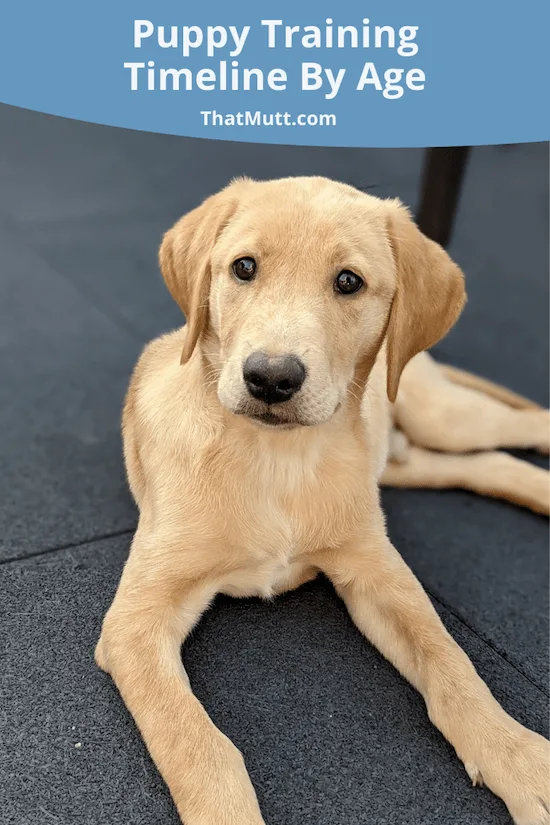
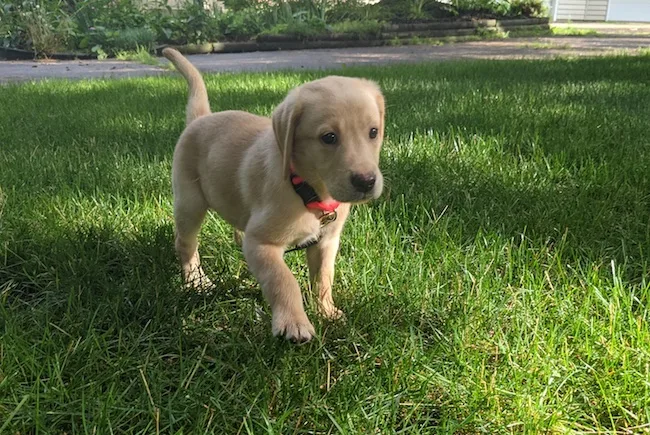
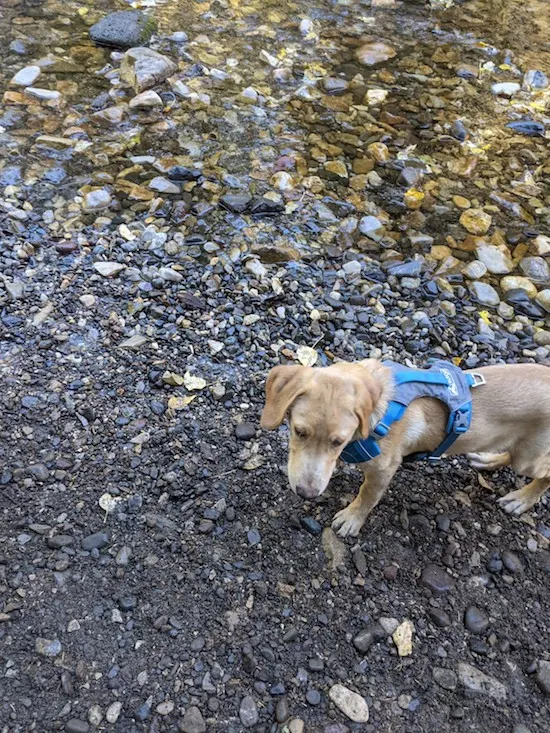
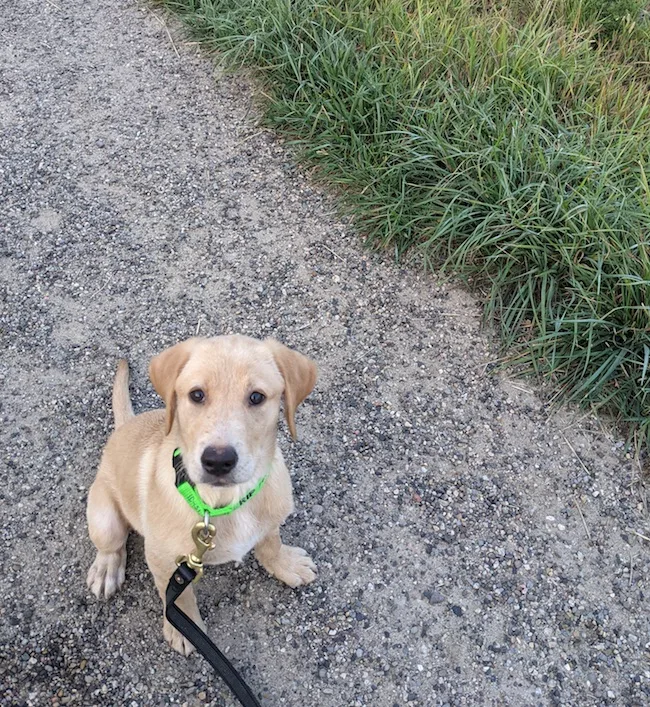
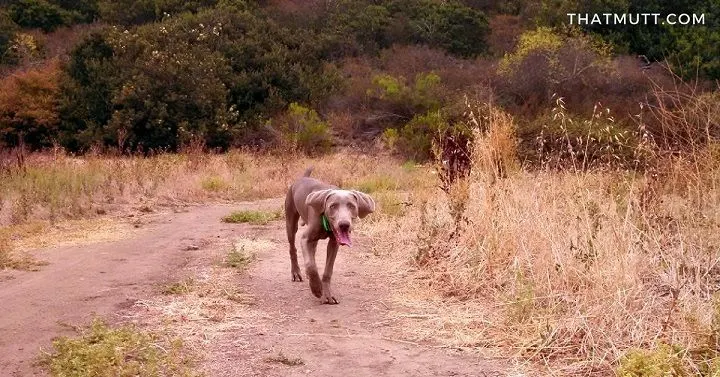
Valerie
Friday 12th of May 2023
Great Tips and Thank You for Sharing!! It’s been 14 years since we had a puppy in the house. Sam was 17 weeks old when we adopted him and he was taught sit, come, down, kisses, paw, sit pretty, crate (House)((Sam’s Space)) trained and goes to the door when it’s duty time. The leash and harness training was especially helpful - inside vs outside first. I was taking Sam in the yard (fenced) for the leash and harness training he wanted “NO” parts of it and treats or toys didn’t matter. Your advice makes perfect sense, less distractions by starting inside.
Melissa
Wednesday 15th of March 2023
Hi I have 2 female German shepherd pups 10 weeks old should I crate them
Patti Z
Friday 3rd of February 2023
Hi Lindsay, thank you so much for your article. I appreciate your realistic approach. It has reassured me that in due time our pup will start to ring the bell to go outside instead of in the house and the biting chewing stage...is a long time. Appreciate it all. Thank you!
Sarwar Abdullah
Sunday 11th of December 2022
Love your article, they have been so helpful. Thank you That Mutt!
Patricia Evleth
Tuesday 5th of April 2022
I just got an 8 month male Weimaraner, who was described by the breeder as very calm, sweet gentle and kind..."a wonderful dog. Also was crate trained, leash trained and almost house broken. Well, Ragnar is really good about the crate, sleeps about nine hours at night and does pretty well on the leash...BUT...He will not poop outside, and appears to have it backwards about marking because the rugs seem to only place where he'll go and will hold it until he gets back inside no matter how long we're outside. I read on your website that 8 months is a somewhat unstable time for puppies and I'm taking some comfort in that because he gets really active (somewhat alarmingly) in the early evening. I'll take whatever help you can give. I'm aware that you're at the end of your first pregnancy ( maybe the loooong wait is already over). I understand that you may not be able to get back to me but maybe you can file this for future reference. Congratulations...you're about to embark on the most wonderful phase of your life. I'm a mother of three, a grandmother of 14, and a great grandmother of 6. It has truly been the most wonderful and truly the most rewarding and meaningful experience of my lifetime.
Lindsay Stordahl
Monday 11th of April 2022
Thank you! I would go back to basics with him, treat his potty training as though he is an 8 week old puppy. Outside frequently on a leash, reward for going outside. Keep him supervised or crated in the house to prevent marking. You can keep him on a leash so he's near you. A belly band may also help as a temporary fix. Some dogs are appalled when they "pee their pants" and will not to it again. But at minimum it will catch the urine vs it getting on your rugs. Good luck.